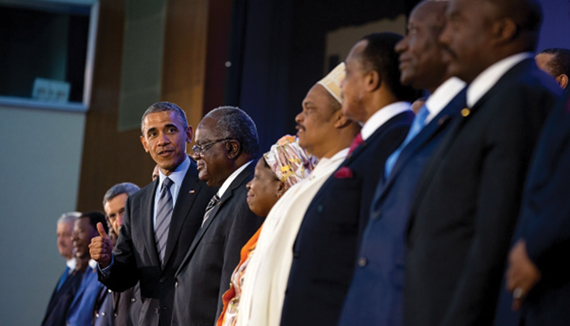
THE United States-Africa Leaders Summit was recently concluded at the behest of President Barack Obama. True to form, this was a follow-up of Obama’s intent to hosting African leaders following his three-nation tour of Africa in 2013.
This will undoubtedly douse the flames of critics who assert that the Obama administration has largely overlooked Africa.
This is the first summit of its kind which was held over three days focused primarily on trade, investment and security issues on the continent.
The theme of the summit was “Investing in the Next Generation” which is forward-looking and optimistic considering that it is believed that in 25 years’ time “four out of ten young people will live in Africa”.
The Summit brought to Washington heads of states from 50 African countries.
Four countries that were omitted from the guest list were the Central African Republic, Eritrea, Sudan and Zimbabwe. Makes one wonder what criteria was used in the selection process.
Surely if President Yoweri Museveni of Uganda could score an invite then surely President Robert Mugabe deserved one too! Even the Equatorial Guinea President Obiang Nguema Mbasogo was present despite repeated calls against him for violation of human rights abuses.
Despite the fact that Zimbawe was not at the summit we had the voices of prominent Zimbabwean businessman Strive Masiyiwa and the young and upcoming tech entrepreneur Tatenda Chingozha.
- Chamisa under fire over US$120K donation
- Mavhunga puts DeMbare into Chibuku quarterfinals
- Pension funds bet on Cabora Bassa oilfields
- Councils defy govt fire tender directive
Keep Reading
Obama reiterated over and over again that Africa was a meteor rising. He also noted that six of the fastest growing economies are on the African continent.
It is true that the African continent is finally coming into its own like a nubile virgin at the onset of puberty. And yes, she has now caught the attention of the erstwhile Americans. This whole Africa rhetoric has strong echoes of the scramble of Africa that occurred in the 19th Century.
Except then it was pioneered by Belgium under King Leopold II lured by Africa’s rich mineral resources. By the time first World War came around Britain owned a stretch of Africa from Cape to Cairo and the French had dominion of West Africa.
The Germans and the Portuguese had between them Namibia, Tanzania, Angola and Mozambique. Sadly today, Africa continues to be demarcated along colonial lines even long after countries have become independent.
However, the dynamics are different. Not only are the minerals are drawcard, but the growing middle class which is a market for much of what is being produced overseas.
As Secretary of State, John Kerry put it; Africa could be the “marketplace of the future”. It has already been emphasised that Africa represents a growing market for US products and US exporters. With a growing middle class with spending power Africa is any marketer’s delight.
The potential not only lies in the export of consumer goods but of construction, energy, health care, transport and infrastructure. Numbers being flung around estimate that Africa is set to grow by 132% between 2010 and 2050 (Pew Research Global).
So now we see a second scramble for Africa. The Chinese and the European Union have already had a strong foothold on much of the continent and the US is ready to follow suit.
However unlike previous supremacy of the continent Africa must also stands to gain from any bilateral trade relationship. Investment taking place should be for mutual benefit and should be conducted on mutual terms.
It appears that everyone else sees Africa’s potential, but do we as Africans see it? We are quick to seek trade with countries like America, China and Europe, but shun each other. What ever became of regional integration? Several regional integration agreements have been enforced like Comesa, Ecowas, Sadc, but how many of these have really yielded any positive results for Africa?
Intra Africa trade is reportedly below 12% yet trade with other countries like Europe is over 60%! Aliko Dangote remarked that he needs 37 visas in order to move around Africa. It seems there is bureaucracy and red tape everywhere to hamper regional co-operation as opposed to fostering it.
Multiple border crossings that are inefficient and plagued with corruption not only increase costs of moving goods, but also the cost of doing cross border business.
Everyday countries are coming up with more draconian immigration laws which make movement across borders tougher.
Inadequate infrastructure also makes the cost of transacting difficult and movement slow and inefficient.
Even flying through Africa is prohibitive with exhorbitant airfares. A flight to Tanzania costs as much if not more than a flight to Europe. I think its time that Africa sees the potential in itself before it allows for others to exploit the potential inherent in us.










